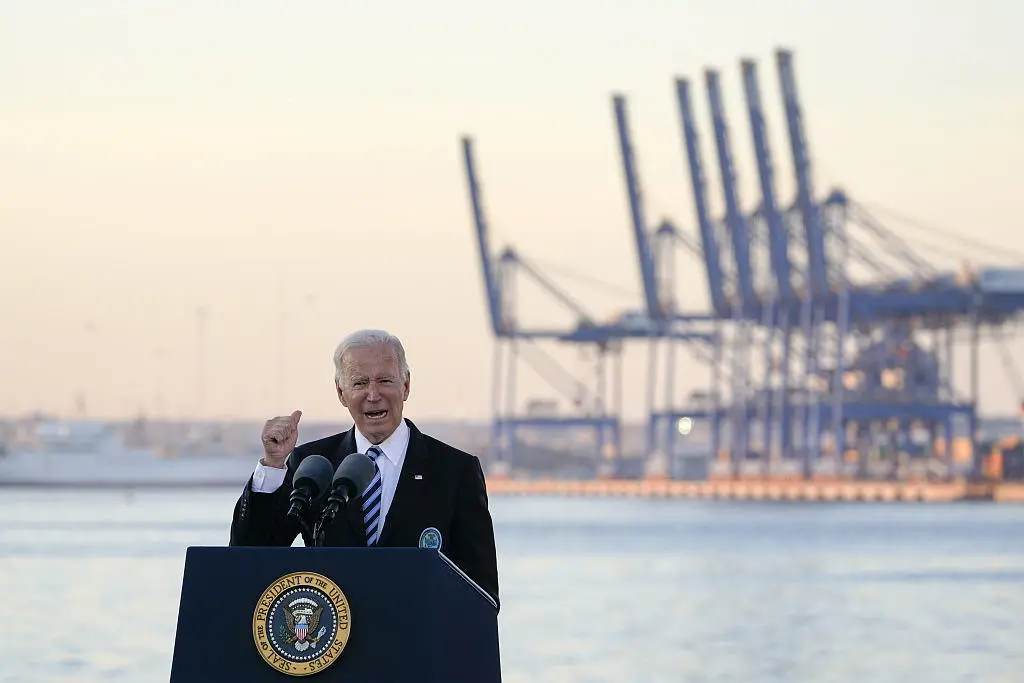The Biden administration has repeatedly concocted a “Chinese crane threat” and recently imposed a 25 percent tariff on Chinese port cranes, a move that has sparked an outcry from ports across the United States, according to Bloomberg.
According to reports, ports in California, Florida, South Carolina, Texas and Virginia, among others, wrote to US Trade Representative Deki last week, make it clear that there are no viable alternatives to China’s cranes, and ask the Biden administration to cancel or delay the tariffs.
Biden’s tariff plan would add more than $130m to the extra cost of US ports, the industry sources warned sternly, that in turn has left it at a disadvantage in competition with other North n ports such as Canada and Mexico.

On November 10,2021, Biden was Helen Delich Bentley Port of Baltimore in Baltimore in the background of a “New Panama” crane (Vision China) made by ZPMC
“U.S. tariffs on chinese-made port cranes are indiscriminate, hurting imports and exports and raising costs for governments, companies and consumers,” Bloomberg said, this is a common view from ports across the United States.
Gary Davis, head of the Port Authority Association, reportedly wrote in a letter on Friday local time that tariffs on Chinese cranes would only have a negative impact, this would seriously affect port efficiency and capacity, exacerbate supply chain strains, which in turn would lead to higher costs of living for consumers and further weakness in the US economy.
The letter noted that, according to the association, seven US ports had signed up for at least 35 chinese-made Gantry crane at an average price of $15m each, the tax increase will cost U. S. Port operators an additional $131.3 million. It stressed that this meant that the ports would not be able to meet their targets and that they would either have to abandon expansion plans or cut back on existing projects.
Barbara Melvyn, head of the port of South Carolina, said ports on the east coast were trying to become more competitive with Mexican and Canadian rivals, this extra cost would result in “Longer waiting times and longer stays for visiting Knock Nevis”.
In a five-page letter, Long Beach Container Terminal Company (LBCT) , a private terminal operator based in Long Beach Harbor, California, laid out some of its objections to us tariffs on Chinese cranes.
In the letter, the company’s director, Bryan Naefke, also questioned the“Ultra vires” of the office of the United States Trade Representative, saying it did not have the authority to impose tariffs on new categories of products during the four-year review, denouncing the move as“Reckless”.
The Helen Delich Bentley Port of Baltimore’s cranes zoom in to see the “Shanghai Zhenhua heavy industry” logo. US media say that nearly 80% of the quayside container cranes used in US ports are produced by Zhenhua heavy industry
Nor are they optimistic about Biden’s“Ambition” to produce new port cranes at home as an alternative to Chinese imports.
In a letter, Paul Anderson, head of the Tampa Bay Port Paul W. S. Anderson, said it was unlikely that american-made Gantry crane would be available soon, although a few could be made in Germany and Finland, but many of their components are also sourced from China and Russia, and those products will still be limited by the new tariffs.
The equally dissenting port of Houston also noted that the slowdown in dock operations, coupled with the serious pollution problems of old cranes, will seriously damage the sustainable development of the environment.
In recent years, despite repeated clarifications from the Chinese and American industry, the American media and politicians have gone to great lengths to hype that chinese-made cranes used in the United States are equipped with complex sensors, the ability to steal U. S. data and secretly send it back to China poses a so-called“Potential threat” to U. S. National Security.
As the 2024 campaign kicked off, President Biden announced in February that more than $20 billion would be spent on port security over the next five years, replace Chinese cranes at ports all over the United States with american-made cranes. The money is said to have come from a $1,000 bn US infrastructure bill passed in 2021 to support the production of cranes by Mitsui’s US subsidiary. It will be the first time in 30 years that the United States has produced a crane domestically.
In mid-may, the White House also announced additional tariffs on about $18 billion worth of Chinese products, in addition to the existing 301 tariffs on China, one of the port crane from the previous duty-free to apply the 25% tariff rate.
For the United States frequently hyped related topics, China has repeatedly stated before. On February 23rd Mao Ning, a spokesman for the Chinese Foreign Ministry, told a regular press conference that it was nonsense for china to “Remotely control data collection by port cranes”, china firmly opposes the US side’s generalization of the concept of national security, its abuse of state power and its unjustifiable suppression of Chinese products and enterprises. The weaponization of economic and trade issues will only aggravate the security risks in the global supply chain and ultimately harm others and oneself. The US side should earnestly respect the market economy and the principle of fair competition and provide a fair, just and non-discriminatory environment for the operation of Chinese enterprises. China will also continue to firmly safeguard the legitimate and lawful rights and interests of its enterprises.